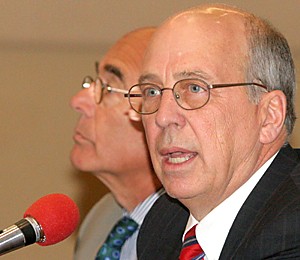Regents approved all the tuition hikes yesterday that were recommended by President Peter Likins, except the rate for undergraduate residents, which regents said may be reduced if the Legislature gives more funding to Arizona universities.
Nonresident undergraduates will pay $1,222 more in tuition next year, and nonresident graduate students can expect an increase of $1,242. Tuition for resident graduate students will also jump by $432.
The regents tabled setting tuition for undergraduate residents because the state Legislature is pending its review on funding for higher education, which may be a larger sum than years past, said Regent Ernie Calderon.
“”The Governor’s Office persuaded us to put that item on hold so we could find out what the state would be giving us before making the increase,”” Calderon said.
Governor Janet Napolitano is recommending the state raise its contribution to student aid from $2.2 million to $9.1 million so more Arizonans can afford college, according to the executive budget.
“”We may not need to increase tuition for residents as much as we thought,”” Calderon said.
Because the regents delayed setting tuition for resident undergraduates, it was surprising they did not wait to increase the tab for Arizona graduate students, said Erin Hertzog, Associated Students of the University of Arizona president.
“”Waiting could really benefit and protect undergrads from unnecessary tuition increases, but it’s disappointing the regents didn’t feel graduate students should have that same protection,”” said Hertzog, a journalism senior.
The student tuition proposal drafted by Hertzog and members of the Graduate and Professional Student Council asked regents to increase tuition for Arizona undergraduates and graduates in the same proportion at 4.6 percent.
In doing so, both resident graduate and undergraduate students would be on the same playing field in terms of predicting increases – a field that Hertzog said is disproportioned.
“”Our mission as a land-grant institution is to protect our residents. This decision was disappointing and I think it’s a big statement,”” Hertzog said. “”Graduate students deserve the low increase, but they didn’t receive it.””
Elaine Ulrich, GPSC president, said the different <
Our mission as a land-grant institution is to protect our residents. This decision was dissapointing and I think it’s a big statement.
ASUA president
increases show the lack of understanding that regents have about a graduate student’s financial worries, which became clear after they approved freezing tuition at UA South.
Likins proposed freezing tuition next year at UA South because those students already juggle responsibilities between school, family and work, and would not be able to afford an increase.
“”Graduate students also have jobs, children and bills,”” Ulrich said. “”We live with those very same issues, yet they were protected and we weren’t.””
The need for a higher percentage increase stems from the larger costs that come with educating a graduate student, Likins said, which includes funding smaller class sizes, purchasing equipment and recruiting quality faculty.
The regents also approved increases in differential tuition for the following colleges:
The College of Architecture and the College of Engineering will both have $600 differential tuitions next year, respectively. Differential tuition applies to juniors and seniors in upper-division coursework.
Though regents approved these differentiated rates, they put off adding definitions to the tuition policy that would allow a differential tuition to exceed the top of the bottom one-third of peer universities nationwide.
Because board policy requires tuition to be kept within that range, to go back and write in exceptions would be “”eroding a promise”” and could jeopardize the credibility of the regents, said Regent Jack Jewett.
But not all regents agreed, citing the top of the bottom one-third is not a sacred formula that will always be effective in providing a quality education.
“”Moses didn’t come down from Mt. Sinai and say the 11th commandment is keeping tuition within the top of the bottom one-third,”” Calderon said. “”We could be forced to go above that if the legislature does not provide enough funding.””









